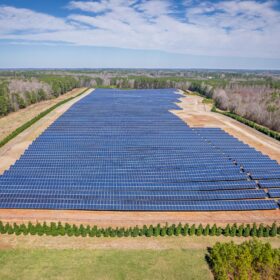Breaking: Explosions at GCL polysilicon fab have reportedly taken down 10% of global production capacity
California-based investment banking group Roth Capital Partners has reported four flash explosions on Sunday and a fifth yesterday “working their way through the GCL facility across multiple systems in a chain-reaction-like sequence.”
NREL looks to tackle PV waste before it’s too late
With up to 80 million tons of solar photovoltaic panels expected to hit landfills globally by 2050, the national lab has taken a look into refining how crystalline silicon module recycling is done — in order to establish a circular market.
Morning Brief: Trina launches 600 W solar module, Jinko hits 24.7% efficiency for n-type mono, Tesla tweaks PV price again
Also in the brief: Trump finalizes rollback of bedrock environmental law, how justice and climate change are inseparable
Job Moves: Lior Handelsman leaves SolarEdge, plus Form Energy, Generate, Omnidian, FirstLight, MP2, Jurchen
Executive, career and boardroom moves in solar, storage, cleantech, utilities and energy VC.
A closer look at Jinko’s 565 W to 585 W panel
The module – which measures 2,411 mm × 1,134 mm × 35 mm, weighs 31.1 kg and features 156 p-type monocrystalline cells – is available in five versions with power outputs of 565 W to 585 W and efficiencies of 20.6% to 21.4%. Jinko says the Pro Tiger series will become the company’s main revenue stream in 2022, surpassing the Tiger 475 W panel.
Morning Brief: newer solar equipment ages gracefully, Solar FlexRack provides trackers for 14 MW of projects
Also in the brief: nearly 1 MW of solar has been installed on the roof of a 300,000-square-foot Kroger bakery facility, a big-rig driver installing solar on his truck, camouflage for solar panels and more.
Morning Brief: 294 MW Muscle Shoals solar project sold to Ørsted
Also in the brief: American solar supplier Aptos Solar added to Loanpal’s approved list, second life EV batteries for use in a microgrid, Maxeon upsizes convertible note offering
Morning Brief: Maxeon raising money, SunPower and Nautilus expanding community solar
Also in the brief: Energy Toolbase integrates Delta.
There’s more to solar systems than module capacity
While solar modules are often defined first and foremost by their capacity, higher module capacity doesn’t necessarily translate to a more efficient system, or even a longer-term yield. Understanding this and reflecting this idea onto customers can be key to delivering the right technology.
Canadian Solar joins the 500 W-plus panel club
The Chinese-Canadian company has unveiled a range of high-power modules which are set to go into mass production by early next year. The series includes a commercial and industrial rooftop-dedicated product offering a reported 405 W.















